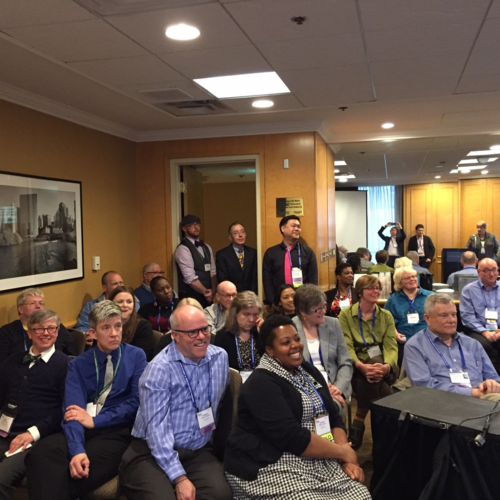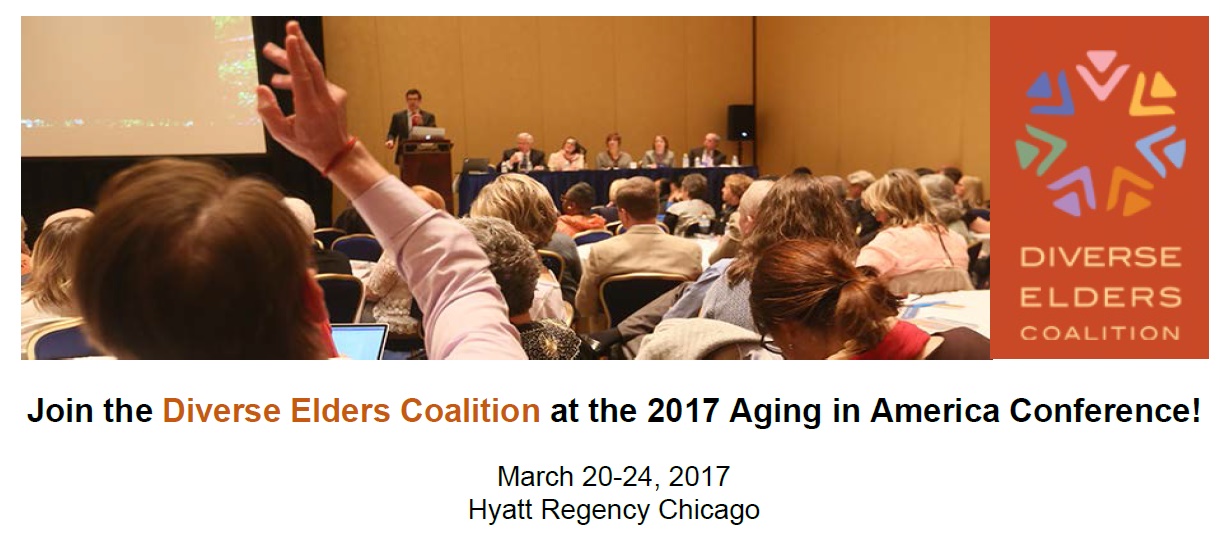Two weeks from today, the Diverse Elders Coalition will be headed to Chicago, IL for the annual Aging in America conference. Each year, the coalition and our five member organizations attend this conference — organized by the American Society on Aging — to talk about issues of aging in communities of color, American Indian/Alaska Native communities, and LGBT communities. We really value the opportunity to present our work and represent diverse elders at this week-long event, the largest multidisciplinary conference covering issues of aging and quality of life for older adults. All too often, our communities are left out of these conversations and conferences, but the volume of programming dedicated to our challenges and resiliencies at AiA is a more realistic reflection of aging in this country.
Will you be joining us in Chicago for the conference? Check out the listing of panels and workshops that our coalition will be presenting! There is valuable content about our communities being shared on every day of the conference, so we hope to see you at these sessions! Keep an eye on our blog this week and next for guest posts and more details about upcoming workshops. We will also be livetweeting many of these panels on our Twitter account during the week of the conference, so make sure you’re following us there!

I’m really excited about the two Diverse Elders Coalition panels that we’ll be hosting:
- On Tuesday, March 21st from 3pm to 4pm CT, representatives from the National Asian Pacific Center on Aging (NAPCA), the National Indian Council on Aging (NICOA), and Services and Advocacy for GLBT Elders (SAGE) will be talking about the importance of job training programs for diverse older adults. Programs like the Senior Community Service Employment Program (SCSEP) and SAGEWorks offer valuable experience for elders who may otherwise be un- or underemployed — and participants give back to their communities in meaningful ways. For more information about this panel, click here.
- On Thursday, March 23rd from 9am to 10:30am CT, all five of the Diverse Elders Coalition member organizations will be hosting a symposium about our recent civic engagement project and subsequent report, “Aging with Health and Dignity: Diverse Elders Speak Up.” We’ll talk about the 2016 campaign in which we partnered with Caring Across Generations to collect nearly 5,000 comments from diverse older adults around the country about their aging needs. In this political moment, it is more important than ever to ensure that the voices of the people we serve are included — prioritized, in fact — in our advocacy efforts on their behalf. The stories and experiences that were shared with our coalition during this campaign will inform our efforts at the federal, state, and local levels in the years ahead. For more information about this panel, click here.
I’m also thrilled to be speaking on a panel about social media and communications with some of the talented and passionate folks from Next Avenue, public media’s first and only national journalism service for America’s booming older population. That workshop will be taking place on Wednesday, March 22nd from 9am to 10:30am CT and will feature some tips and tricks for advocacy organizations interested in using social media to further their mission’s message. We’ll have another blog post about this panel later this week, but for more information, click here!
This year will actually be my first time attending AiA, and it feels like the perfect time to be getting involved. I’m really looking forward to so many of the workshops that our coalition members and friends are organizing, including discussions about housing, caregiving, Alzheimer’s and dementia, storytelling, and more. For a complete listing of all of our programming at Aging in America, click here. And keep reading our blog all this month for highlights from the conference!
To register for the 2017 Aging in America conference, visit http://www.asaging.org/aia
See you in Chicago!
The opinions expressed in this article are those of the author and do not necessarily reflect those of the Diverse Elders Coalition.


